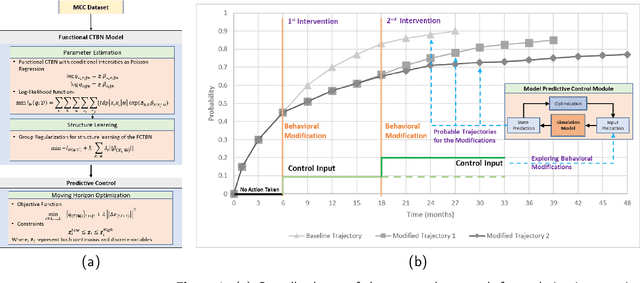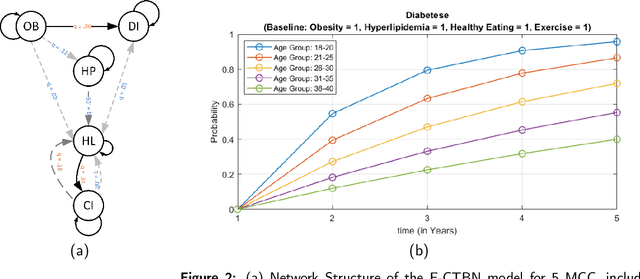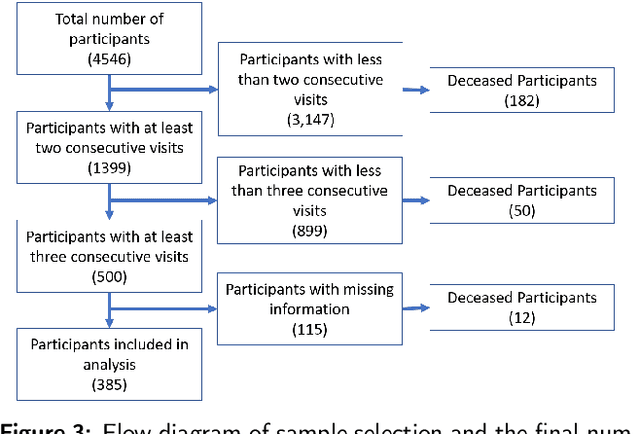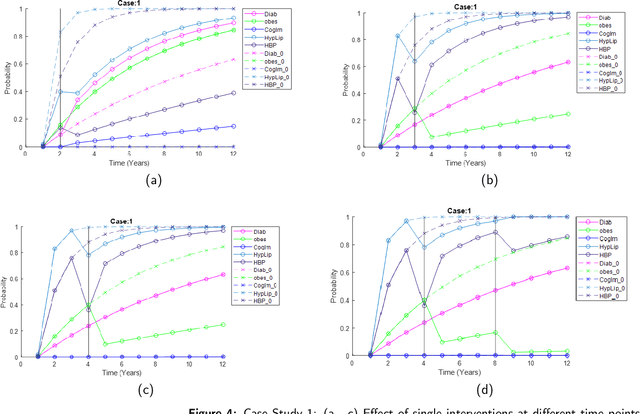Susan P Fisher-Hoch
A Model Predictive Control Functional Continuous Time Bayesian Network for Self-Management of Multiple Chronic Conditions
May 26, 2022



Abstract:Multiple chronic conditions (MCC) are one of the biggest challenges of modern times. The evolution of MCC follows a complex stochastic process that is influenced by a variety of risk factors, ranging from pre-existing conditions to modifiable lifestyle behavioral factors (e.g. diet, exercise habits, tobacco use, alcohol use, etc.) to non-modifiable socio-demographic factors (e.g., age, gender, education, marital status, etc.). People with MCC are at an increased risk of new chronic conditions and mortality. This paper proposes a model predictive control functional continuous time Bayesian network, an online recursive method to examine the impact of various lifestyle behavioral changes on the emergence trajectories of MCC and generate strategies to minimize the risk of progression of chronic conditions in individual patients. The proposed method is validated based on the Cameron county Hispanic cohort (CCHC) dataset, which has a total of 385 patients. The dataset examines the emergence of 5 chronic conditions (diabetes, obesity, cognitive impairment, hyperlipidemia, and hypertension) based on four modifiable risk factors representing lifestyle behaviors (diet, exercise habits, tobacco use, alcohol use) and four non-modifiable risk factors, including socio-demographic information (age, gender, education, marital status). The proposed method is tested under different scenarios (e.g., age group, the prior existence of MCC), demonstrating the effective intervention strategies for improving the lifestyle behavioral risk factors to offset MCC evolution.
Nonlinear State Space Modeling and Control of the Impact of Patients' Modifiable Lifestyle Behaviors on the Emergence of Multiple Chronic Conditions
Jul 14, 2021Abstract:The emergence and progression of multiple chronic conditions (MCC) over time often form a dynamic network that depends on patient's modifiable risk factors and their interaction with non-modifiable risk factors and existing conditions. Continuous time Bayesian networks (CTBNs) are effective methods for modeling the complex network of MCC relationships over time. However, CTBNs are not able to effectively formulate the dynamic impact of patient's modifiable risk factors on the emergence and progression of MCC. Considering a functional CTBN (FCTBN) to represent the underlying structure of the MCC relationships with respect to individuals' risk factors and existing conditions, we propose a nonlinear state-space model based on Extended Kalman filter (EKF) to capture the dynamics of the patients' modifiable risk factors and existing conditions on the MCC evolution over time. We also develop a tensor control chart to dynamically monitor the effect of changes in the modifiable risk factors of individual patients on the risk of new chronic conditions emergence. We validate the proposed approach based on a combination of simulation and real data from a dataset of 385 patients from Cameron County Hispanic Cohort (CCHC) over multiple years. The dataset examines the emergence of 5 chronic conditions (Diabetes, Obesity, Cognitive Impairment, Hyperlipidemia, and Hypertension) based on 4 modifiable risk factors representing lifestyle behaviors (Diet, Exercise, Smoking Habit, and Drinking Habit) and 3 non-modifiable risk factors, including demographic information (Age, Gender, Education). The results demonstrate the effectiveness of the proposed methodology for dynamic prediction and monitoring of the risk of MCC emergence in individual patients.
 Add to Chrome
Add to Chrome Add to Firefox
Add to Firefox Add to Edge
Add to Edge